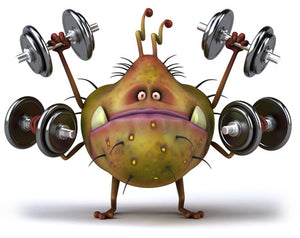Exercise May Positively Change the Makeup of Bacteria in Your Gut
February 19, 2018

Exercise can positively change the makeup of the bacteria in your intestines no matter what you eat, according to the results of a new study.
The researchers conducted the first trial in mice to test the hypothesis that exercise modifies the bacterial profile of the gut, even without changing what the mice ate. The team published the findings from this first study in the medical journal, Gut Microbes.
The scientists performed fecal transplants from 10 mice that had undergone exercise for six weeks to germ-free mice. The mice receiving the transplants showed significant differences in the composition of bacteria in the gut, colon inflammation, metabolic parameters and weight as compared with nine sedentary mice in the control group. This step in the study proved that the fecal transplant worked.
Furthermore, the mice that exercised exhibited reduced symptoms of induced colitis as compared with inactive mice. The mice that received bacteria through fecal transplants from exercised mice showed a reduction in inflammation associated with colitis and demonstrated an increase in the molecules that speed recovery.
Exercise Changes the Bacterial Makeup in the Human Gut Too
Having validated the theory that exercise alters the bacteria in the gut of mice, the scientists wanted to determine if changes in physical activity would have the same effect in humans. The research team from the University of Illinois at Urbana-Champaign, Urbana, then replicated the test in humans. They published their findings in the subsequent human study in Medicine & Science in Sports & Exercise.
The researchers enrolled 32 lean and 14 obese, previously sedentary people into the study. The participants participated in six weeks of supervised cardiovascular exercise on three days per week. The exercise progressed from 30 to 60 minutes per day and progressed in intensity over the duration of the exercise portion of the study. The participants then returned to a sedentary lifestyle for a six-week washout period. The subjects continued whatever diet they had been consuming prior to the study.
The scientists gathered fecal samples before and after the six-week exercise period, and after the washout period. They found significant differences in the diversity of gut bacteria of the lean participants before and after six weeks of exercise, and improved concentrations of short-chain fatty acids (SCFAs). The changes in obese participants were much less dramatic and statistically insignificant.
The changes were not permanent, though, as the bacterial composition in participants’ guts gradually returned to their baseline levels during the six-week sedentary washout period.
In essence, the study shows that exercise causes positive changes in the human gut microbiome no matter what the person eats, but that improvements depend on obesity status and that the benefits only last as long as the individual continues to exercise.
The researchers performed sequencing analysis and found that exercise could affect the production of short-chain fatty acid (SCFA), which is a key source of nutrition for cells in your colon and play an important role in health and disease. Certain species of beneficial bacteria in the colon ferment fibers. In the fermentation process, the beneficial bacteria produce metabolites, including SCFA. Sequencing analysis showed that exercise changed the metabolites to resemble those produced by species capable of SCFA production.
Using exercise to improve the makeup of bacteria in the gut would be especially helpful to human health. Many scientists attribute most of the diseases affecting humans living in westernized nations to microbial imbalances, known as dysbiosis, and loss of microbial diversity in the gut. Antibiotic use, environmental triggers, and a diet filled with processed carbohydrates can reduce microbial diversity in the gut. Research links the consumption of diets low in fiber and high in processed carbohydrates with an increased incidence of inflammatory diseases and intestinal cancers in people living in developed nations.
Diverse gut microbiota is an indicator of better health. One study correlates good microbial diversity with good health in older adults. Gut microbiota may influence mood and behavior.
Loss of diversity is associated with health problems. Changes in microbial diversity in the gut influence inflammation in patients with inflammatory bowel disease (IBD), for example. Other research associates negative changes in microbial diversity to bowel cancer and breast cancer.
While exercise cannot prevent all human diseases, it can improve the bacterial makeup of the gut. Consuming a nutritious, high-fiber diet and taking probiotic supplements can also improve your health.
The post Exercise May Positively Change the Makeup of Bacteria in Your Gut appeared first on Natren Probiotics Blog.





Leave a comment